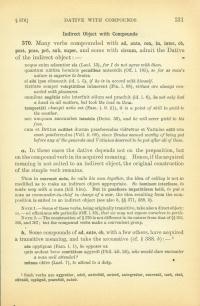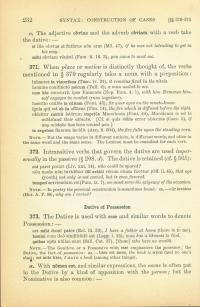370. Many verbs compounded with ad, ante, con, in, inter, ob, post, prae, prō, sub, super, and some with circum, use the Dative of the Indirect Object.
Neque enim adsentior eīs. (Lael. 13)
For I do not agree with them.
quantum nātūra hominis pecudibus antecēdit (Off. 1.105)
so far as man's nature is superior to brutes
sī sibi ipse cōnsentit (id. 1.5)
if he is in accord with himself
Virtūtēs semper voluptātibus inhaerent. (Fin. 1.68)
Virtues are always connected with pleasures.
Omnibus negōtiīs nōn interfuit sōlum sed praefuit (id. 1.6)
He not only had a hand in all matters, but took the lead in them.
Tempestātī obsequī artis est. (Fam. 1.9.21)
It is a point of skill to yield to the weather.
Nec umquam succumbet inimīcīs. (Deiot. 36)
And he will never yield to his foes.
cum et Brūtus cuilibet ducum praeferendus vidērētur et Vatīnius nūllī nōn esset postferendus (Vell. 2.69)
since Brutus seemed worthy of being put before any of the generals and Vatinius deserved to be put after all of them
a. In these cases the dative depends not on the preposition, but on the compound verb in its acquired meaning. Hence, if the acquired meaning is not suited to an indirect object, the original construction of the simple verb remains.
Thus in convocat suōs (he calls his men together) the idea of calling is not so modified as to make an indirect object appropriate. So hominem interficere (to make way with a man, i.e. kill him). But in praeficere imperātōrem bellō (to put a man as commander-in-chief in charge of a war) the idea resulting from the composition is suited to an indirect object (see also b. and § 371, below; also § 388.b).
Note 1— Some of these verbs, being originally transitive, take also a direct object
nē offerāmus nōs perīculīs (Off. 1.83)
that we may not expose ourselves to perils
Note 2— The construction of § 370 is not different in its nature from that of § 362, § 366, and § 367; but the compound verbs make a convenient group.
b. Some compounds of ad, ante, ob, with a few others, have acquired a transitive meaning, and take the accusative (cf. § 388.b).1
Nōs oppūgnat (Fam. 1.1)
He opposes us.
Quis audeat bene comitātum aggredī? (Phil. 12.25)
Who would dare encounter a man well attended?
mūnus obīre (Lael. 7)
to attend to a duty
c. The adjective obvius and the adverb obviam with a verb take the Dative.
sī ille obvius eī futūrus nōn erat (Mil. 47)
if he was not intending to get in his way
Mihi obviam vēnistī. (Fam. 2.16.3)
You came to meet me.
371. When place or motion is distinctly thought of, the verbs mentioned in § 370 (above) regularly take a noun with a preposition.
Inhaeret in visceribus. (Tusc. 4.24)
It remains fixed in the vitals.
homine coniūnctō mēcum (Tull. 4)
a man united to me
Cum hōc concurrit ipse Eumenēs. (Nep. Eum. 4.1)
Eumenes himself engages in combat with him.
(runs together)
Inserite oculōs in cūriam (Font. 43)
Fix your eyes on the senate house.
īgnis quī est ob ōs offūsus (Tim. 14)
the fire which is diffused before the sight
Obicitur contrā istōrum impetūs Macedonia. (Font. 44)
Macedonia is set to withstand their attacks.
[Cf. sī quis vōbīs error obiectus (Caec. 5)
if any mistake has been caused you]
In segetem flamma incidit. (Aen. 2.304)
The fire falls upon the standing grain.
Note— But the usage varies in different authors, in different words, and often in the same word and the same sense.
372. Intransitive verbs that govern the Dative are used impersonally in the passive (§ 208.d). The dative is retained (cf. § 365).
Cui parcī potuit (Liv. 21.14)
Who could be spared?
Nōn modo nōn invidētur illī aetātī vērum etiam favētur. (Off. 2.45)
That age (youth) not only is not envied, but is even favored.
Temporī serviendum est (Fam. 9.7)
We must serve the exigency of the occasion.
Note— In poetry the personal construction is sometimes found.
Cūr invideor (Hor. A. P. 56)
Why am I envied?


